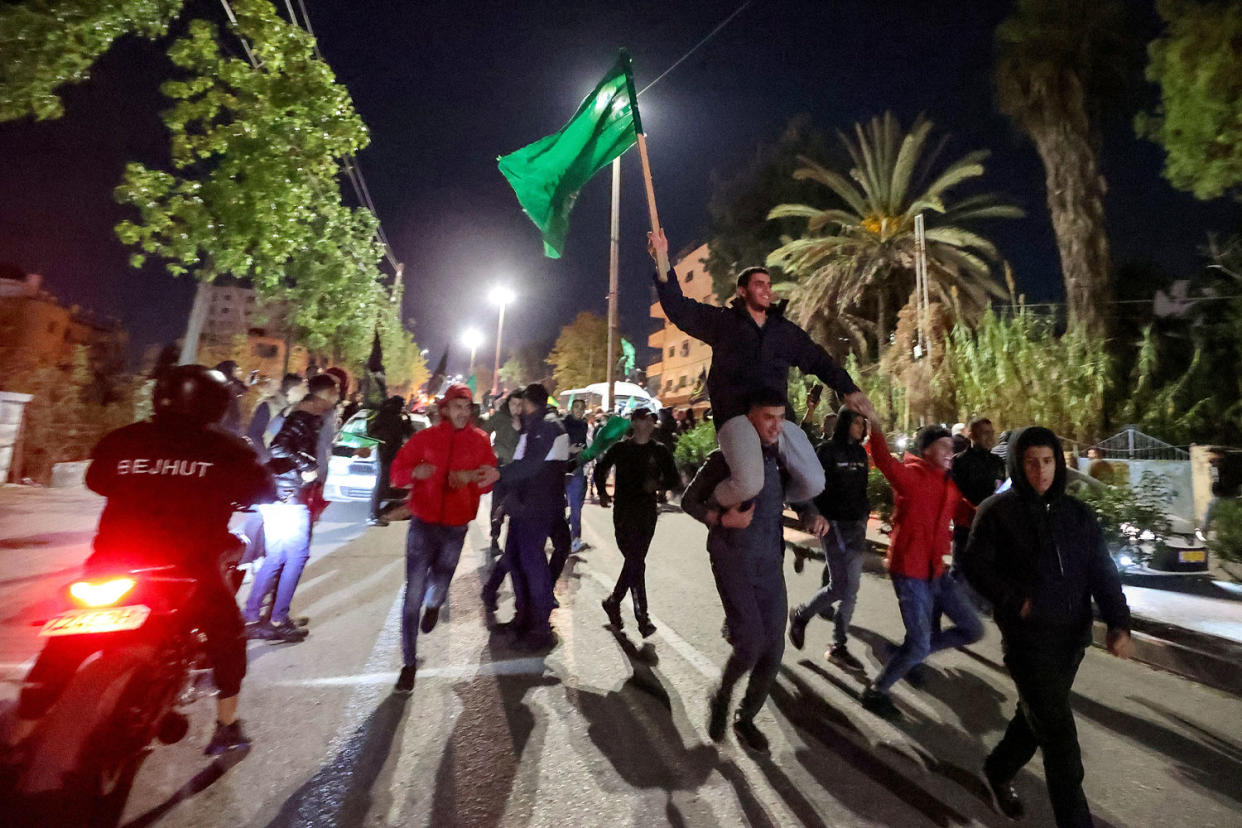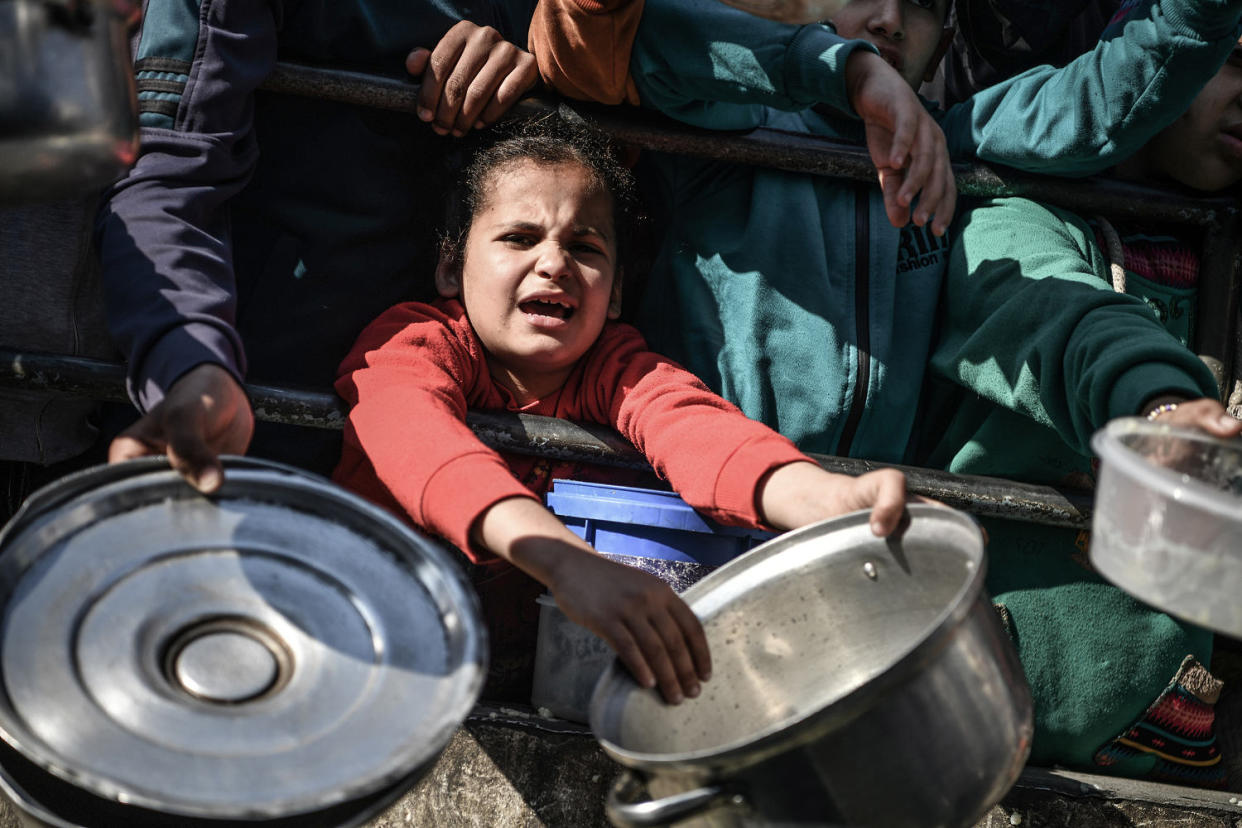Palestinian support for 'armed struggle' is rising as Gaza death estimate tops 20,000
As the death toll in Gaza reached an estimated 20,000 on Thursday, the majority of them women and children, a poll released last week by a leading Palestinian research firm offered a window into how Palestinians in Gaza and the occupied West Bank view the war.
The survey, which was conducted in late November, found that 63% of Palestinians polled favored “armed struggle” as the best strategy to secure an independent state and end Israel’s occupation. That represents a 10% rise in support since a survey conducted by the same center three months ago.
Only 20% of those polled supported negotiations and 13% backed non-violent protest. The results reflect the belief among many Palestinians that decades of appealing to the international community, conducting boycotts, and waiting for a two-state diplomatic solution have proved fruitless.
“It is important to understand that the majority of Palestinians do not see the attacks on Israel as terrorism,” said Khalil Sayegh, who was born and raised in Gaza, received a Master’s Degree from American University and is now a political analyst based in Washington, D.C.
“They see ‘armed struggle’ as a normal reaction for the Palestinians to gain their freedom out of the occupation,” he added.
The vast majority of Palestinians polled, however, said they don’t support killing or kidnapping Israeli civilians. Seventy-eight percent agreed that the laws of war ban the attacking or killing of civilians in their own homes. Fifty-six percent said that it banned taking civilians prisoner.

At the same time, Palestinian respondents questioned whether Hamas fighters had committed war crimes on Oct. 7. Eighty-five percent of respondents said they had seen no videos from international news channels or social media platforms showing Hamas members committing atrocities during the attack.
Regional Arabic-language news media has primarily focused on Palestinian deaths and the destruction wrought on Gaza and not shown the extent of the atrocities committed on Oct 7. Israeli officials say more than 1,000 civilians were killed and roughly 200 civilians were taken hostage by Hamas in the deadliest attack on Israel’s soil.
Yousef Munayyer, a senior fellow and head of the Palestine/Israel Program at the Arab Center in Washington, said that the poll's findings should be a “wake-up call” for the Biden administration and U.S. lawmakers when it comes to aiding and funding Israel’s war effort.
“Some people will look at this and they will say, ‘Oh, well, this just means we need to kill a lot more Palestinians,’” Munayyer said. “That doesn’t understand the lesson here, which is that you cannot kill people into liking you. Until you sort of grasp that — it’s impossible to break out of this unending pattern of bloodshed.”
“Where are the Palestinian officials?”
The poll found that in the West Bank support for Hamas — an Islamist militant group that is designated a terrorist organization by the U.S., the U.K. and other countries — had more than tripled, from 12 % to 44%. In Gaza, meanwhile, support increased by only 4%, from 38% to 42%.
“Hamas as a regime has been looked at very negatively,” Sayegh said of public disapproval in Gaza among locals still living there.
Since Hamas won the last elections held in Gaza, in 2006, politics have been stifled there, with Hamas ruling the Palestinian enclave for nearly two decades in an authoritarian fashion that doesn’t allow for robust public debate. Half of Gaza’s population is under the age of 19, and as a result, most residents have not voted in their lifetime. At the same time, they have endured a 16-year Israeli blockade that has crippled the economy and restricted their movements.
Despite the risks that come with public opposition, rare protests took place this past summer that saw thousands of Palestinians demand better living conditions.
And while Israel’s crushing military offensive has decimated large parts of the Strip and seen nearly all of those in Gaza displaced from their homes, there is still disgruntlement in the enclave with Palestinian political leaders, from Mahmoud Abbas, the head of the Palestinian Authority, which partially governs the West Bank, to Ismail Haniyeh, the political leader of Hamas.
“We have extraordinary suffering,” Aziza Alsharif, a mother sheltering in a tent camp in a school in Khan Younis, told NBC News in Gaza. “Where are the Palestinian officials? We are suffering, and they are sitting. Why? Where are Mahmoud Abbas and Ismail Haniyeh?”
Palestinians in the West Bank, unlike those in Gaza, have never been governed by Hamas, Sayegh noted. They don’t “pay the price” for the group’s actions and mismanagement, which is why they are likely to be more supportive of Hamas.
“It’s not your home that’s being bombed,” Sayegh said of the surge in support for Hamas in the West Bank. “They don’t have direct experience with Hamas as a government or as a regime in Gaza as the people in Gaza.”
When Palestinian prisoners — often held without charges — were released in exchange for Israeli hostages during a cease-fire last month, crowds in the West Bank waved Hamas flags as music blared from outdoor speakerphones.
“They say free Gaza from Hamas, but it’s not true,” Yara Shyoukhi, a 19-year-old university student studying French in the West Bank told NBC News during the cease-fire. “They defend Palestine. They are not terrorists. They are defenders of the country because we are under occupation.”
“The whole world is not speaking”
The poll, as well as telephone interviews, suggested that as the war in Gaza continues, anger at the United States and Europe is rising among Palestinians as well.
“America is the patron of humanity. It’s a democratic country. Despite all this, they are watching the massacres that are happening here in Gaza,” said Sameh Adel, a 44-year-old teacher with four children who is currently sheltering in a kindergarten center in Rafah, in southern Gaza.
“Watching our killings. Children are dying, women are dying, and the whole world is not speaking,” he said in an audio message to NBC News.
Adel added that people in Gaza were frustrated not only with European countries and the U.S. but also “Arab states that are considered brotherly.”
“They don’t aid us. They are watching us and see our suffering, food and starvation,” he added.

The poll was conducted by the Palestinian Center for Policy and Survey Research in the West Bank and Gaza from Nov. 22 to Dec. 2. In Gaza, it was conducted during the week-long ceasefire. A total of 1,231 Palestinians were interviewed, with 750 in the West Bank.
For decades, the center has polled the Palestinian community in Jerusalem, the West Bank and Gaza on a quarterly basis. The center is based in Ramallah and run by professor Khalil Shikaki, who received a doctorate in political science from Columbia University and has been a senior fellow at the Crown Center for Middle East Studies at Brandeis University since 2005.
Aid groups say they are struggling to convey the scope of the humanitarian crisis in Gaza, which they say has left half of Gazans starving. A new U.N report predicts a famine will take hold in the Gaza Strip if hostilities continue and aid distribution remains hampered.
While Palestinians criticized Hamas and the Palestinian Authority for corruption and the U.S. for indifference they said they blame the Israeli government more than any other actor.
“Honestly, we’ve had enough with this perception that these political parties are the problem of the Palestinian people,” said Mohammed Mhawish, a 24-year-old writer based in Gaza. “They are part of the problem, but it’s because the occupation doesn’t allow any mere existence, not only for a Palestinian population, but also for a Palestinian unified representation.”
Experts said that support for armed resistance among Palestinians has historically risen during Israeli military campaigns and dropped afterward.
But Munayyer said that the current Israeli offensive is unprecedented and that it is vital to pay attention to the poll’s findings. Palestinians increasingly view armed resistance as their only path to statehood, endangering the longstanding goal of successive U.S. administrations of a two-state solution.
“There’s the support for the use of arms that transcends political factions and transcends ideology,” said Munayyer. “Palestinians have witnessed other strategies, and where they have gotten them. They don’t see those things as effective.”
